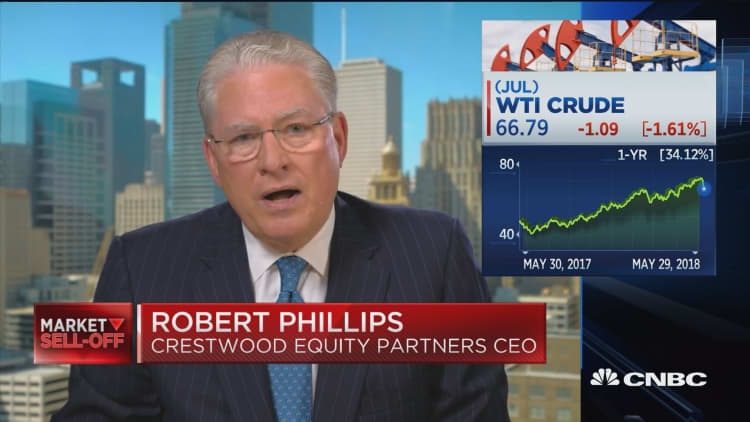Oil prices rebounded sharply on Wednesday, supported by a report that Saudi Arabia, other OPEC states and non-OPEC allies aim to stick to a global pact on cutting oil supplies until the end of 2018.
The producers are ready to make gradual adjustments to offset any supply shortage, a Gulf source familiar with Saudi thinking said. The oil producers participating in the output reduction deal are satisfied with the result of their agreement, which was due to end at the end of 2018, the Gulf source told Reuters.
U.S. crude ended the session $1.48, or 2.2 percent, higher at $68.21. The contract fell about $5.50 a barrel, or 7.6 percent, over the last five trading sessions.
Brent ended Wednesday's trading up $2.11, or 2.8 percent, to $77.50 a barrel, after trading as low as $74.81 earlier.

Global benchmark Brent crude has dropped by as much as $5 a barrel this week from a 3½-year high of $80.50 a barrel on May 17, after reports that OPEC and Russia may increase supply at a June meeting.
Also on Wednesday, the Russian central bank issued a statement that a decline in oil prices would pose a risk to the country's financial sector.
"It seems that somebody in the central bank is taking notice of the big drop in oil prices and sending a signal of, 'Hey, wait a second. We don't want these prices to fall too far — that could pose a risk to the Russian economy"' said Phil Flynn, analyst at Price Futures Group in Chicago.
The Organization of the Petroleum Exporting Countries and non-OPEC producers led by Russia have had a pact to curb output by about 1.8 million barrels per day since January 2017, driving down inventories and pushing up oil prices.
Amid concerns the price rally has gone too far, Saudi Arabia and Russia are discussing raising OPEC and non-OPEC oil output by around 1 million bpd, sources told Reuters on May 25. OPEC meets in Vienna on June 22.
Some analysts remain cautious as the details have yet to be worked out. Ministers from Saudi Arabia, Kuwait and the United Arab Emirates meet this weekend, a source said.
U.S. crude's discount to Brent was as much as $9.31, with Brent supported more as investors worried that crude supplies from Iran could be drying up, with U.S. sanctions deterring buyers.

"There's more concern on the Brent side that supply losses from Iran are harder to be made up," Flynn said.
India's Reliance Industries, owner of the world's biggest refining complex, plans to halt oil imports from Iran, two sources familiar with the matter said.
Also supporting prices was a weaker dollar and forecasts that U.S. data will show crude inventories fell last week, analysts said.
U.S. crude inventories probably fell by 1.8 million barrels last week according to a Reuters poll. Industry group American Petroleum Institute (API) releases its weekly supply report at 4:30 p.m. ET on Wednesday, followed by the official government data on Thursday.
In Brazil, the FUP oil workers union said workers had joined the call for a nationwide strike on at least 20 oil rigs in the lucrative Campos basin and other areas of the country. Protesters are calling for the resignation of Petroleo Brasileiro SA Chief Executive Officer Pedro Parente and a change to company fuel pricing policies. The company said production was not affected.
— CNBC's Tom DiChristopher contributed to this story.

